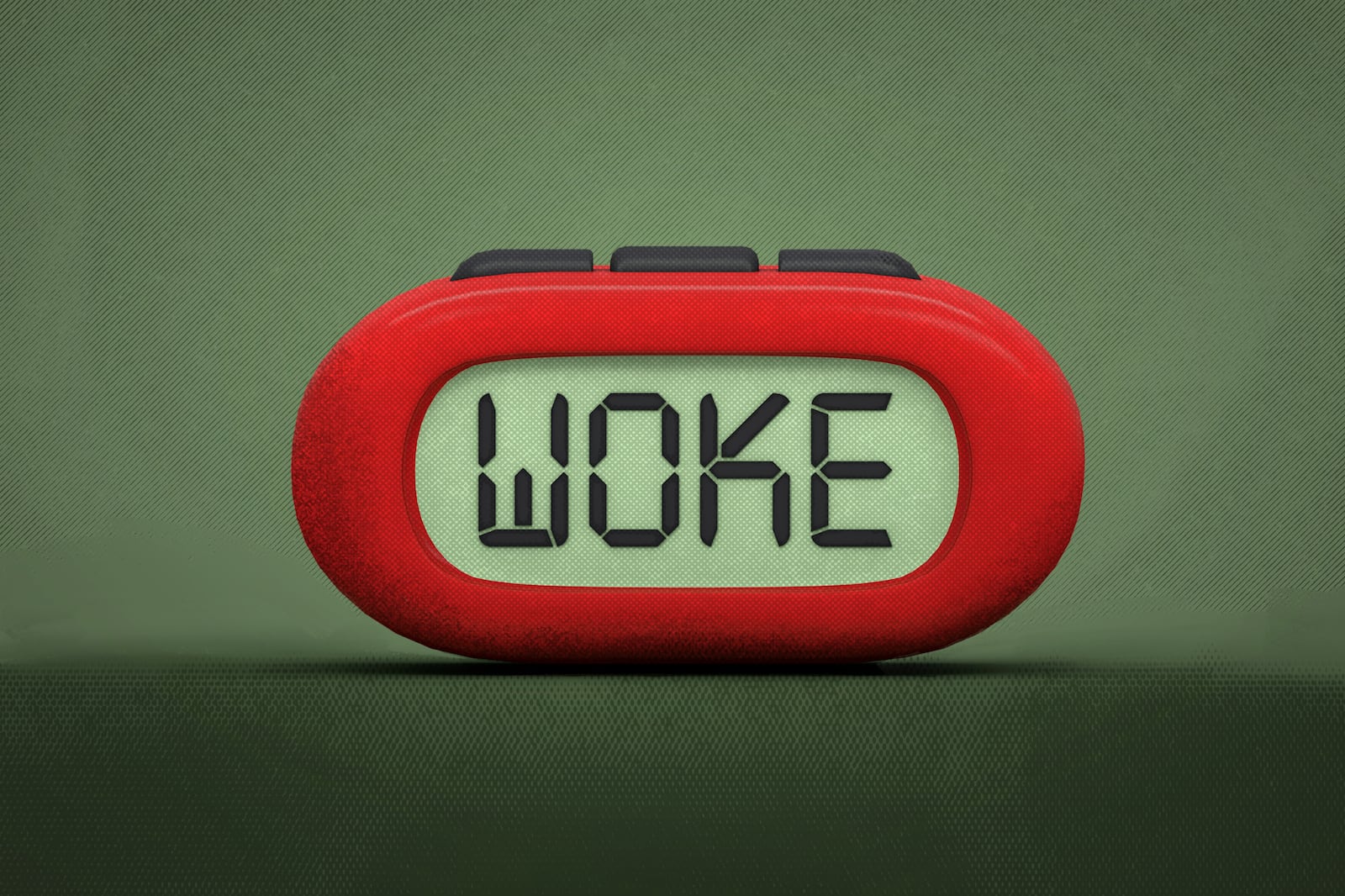Tesla CEO Elon Musk, who designed his first video game at age 12, recently tweeted an idea for another: “Woketopia: Battle for the Moral Ground.”
In the tweet, Musk mocked “wokeness,” a concept that, for a time, was seen as a virtue among many young Americans and progressives.
What is woke?
Being “woke” is, according to Merriam-Webster, “aware and actively attentive to important facts and issues (especially issues of racial and social justice).”
The Oxford English Dictionary, which added “woke” in 2017, says the term and its derivatives are commonly used to describe people who are “alert to racial or social discrimination and injustice.”
Originally slang used by Black Americans, the word became part of the national lexicon in the past few years. But its meaning has already changed, and there is a divide in how the word is perceived, a divide that is both political and generational.
“OK boomer,” one person responded to Musk’s tweet. Born in 1971, Musk isn’t a baby boomer, but the tweet revealed the perception that it’s older, conservative Americans who are obsessed with wokeness and its societal effects.
Politically, wokeness has been seen by some progressives and liberals as aspirational, and the hashtag #staywoke abounds on social media. Many conservatives, however, view the meaning of wokeness as a joke, or conversely, as a societal evil akin to cancel culture. They frequently use the term “woke mob” to describe collective outrage that results in a loss of professional or social standing because of a person’s beliefs, statements or actions.
The political divide is not surprising, since it is Democrats and young people who are most likely to be involved in protests for racial equality, according to Pew Research Center.
But Musk, Republican Sens. Tom Cotton, of Arkansas, and Ted Cruz, of Texas, and others who use the word regularly should be aware that, almost as quickly as it came on the stage, the word’s meaning has changed, according to University of Pennsylvania linguist Nicole Holliday. Here’s how the word came into the American lexicon, and what it means now.
Rise of the woke
One of the earliest uses of “woke,” outside of its most common meaning (to literally wake up from sleep), was in 1962, when a glossary of African American slang defined the word as “well informed” and “up-to-date,” according to Holliday, assistant professor of linguistics at the University of Pennsylvania in Philadelphia, writing for the Oxford Dictionaries blog.
A decade later, the play “Garvey Lives!,” written by Barry Beckham, contained the line, “I been sleeping all my life. And now that Mr. Garvey done woke me up, I’m gon stay woke. And I’m gon help him wake up other black folk.”
By the time Erykah Badu sang “I stay woke” in her 2008 song “Master Teacher,” Black Americans were using the word to signify awareness, said Holliday, who has a Ph.D. in linguistics.
Later, Holliday said, the word “woke” became mainstream in the outrage over the killing of Trayvon Martin, the 17-year-old shot by a neighborhood watchman in Florida in 2012, and the subsequent rise of the Black Lives Matter movement. But then, as more people began to use it and the word entered the mainstream political landscape, the meaning of woke was separated of its original context — wakefulness among Black Americans — and by 2016, when MTV pronounced it a “word to use,” it was simply defined as “being aware — specifically in reference to current events and cultural issues.”
The word changed again, as some people started using it to mock people and beliefs they disagree with, and the word is now predominantly a negative term, she said in an interview.
“This process of acquiring a pejorative meaning happened really quickly,” she added. “This is something that the internet does to words. It moves them really quickly.”
Lost identity
Kelly Elizabeth Wright, a Ph.D. candidate in sociolinguistics at the University of Michigan, said she first encountered the word in 2015 after the death of Sandra Bland in a jail cell in Texas started a national conversation about law enforcement’s treatment of Black Americans. “Placing and resisting the death of Sandra Bland and others like her calls for wokeness,” Wright said in an email.
“The thing about staying woke, for Black people, is that it is a necessity. We don’t choose to be woke, we must be woke to stay alive, to know when we are being lied to or exploited in some way. We need to stay woke to know when we are in danger,” she said. “It is a reflection of the vigilance inherent in Black life. And this points to something really special about lexical histories: they are born from lived experience, and thus are constantly in flux.”
The evolution of woke, therefore, isn’t unusual. And it’s not just conservatives on Twitter who are responsible for the changing meaning.
Wright, a contributing editor for the “Among the New Words” column at the journal American Speech, said that today, the word no longer marks “the good and necessary work of individual awareness building but instead the hollowness of so much neoliberal flotsam.”
“The word has effectively been semantically bleached,” she said.
As an example, she pointed to antiracism statements put out by companies and organizations in the summer of 2020. Many companies and organizations “want to claim the mantle of wokeness” without making meaningful changes, she said.
A new religion?
As early as 2016, some people were saying that “peak wokeness” had been achieved, and there have been occasional calls for the term to be retired.
Still, the word “woke” and its derivatives still make the news regularly; most recently in a column about the termination of Teen Vogue editor Alexi McCammond over old tweets for which she had apologized and South Carolina GOP Sen. Tim Scott’s remarks about “woke supremacy.”
And some publications that used to put quotation marks around the word “woke” now print it without the punctuation, which seems a concession to the term’s legitimacy.
Indeed, wokeness, to describe hyperawareness of racial and social justice issues, may be here to stay, like cancel culture. A writer for The Nation recently said “the Great Awokening is gathering speed.” Some have likened wokeness to a new, secular religion, similar to the Great Awakening, the religious revival of the 18th century, among them the Catholic scholar and author Joseph Bottum.
But as a serious term, woke is over, Holliday said.
From PC to woke
Holliday described the rise and fall of “woke” as similar to what happened to the term “political correctness,” which she said was used in the 1980s and in the 90s by the left. “It was always a little tongue in cheek, but it was serious in that people wanted to respect diversity, to respect the political differences that exist. That’s what it meant,” she said. “But as soon as people who did not share that ideology started using it, it became pejorative.”
That’s what happened to “woke,” she said, with the added insult that a term used by “marginalized people to discuss their experiences in the community ... suddenly gets used by the people who are marginalizing them, as a joke.”
As such, many Black Americans don’t use the term anymore, nor do the young activists who are often described as woke by other people. No term has replaced it, but people are more likely to use plain language such as the need for respect and civility. Instead of saying something is the “woke” thing to do, people are more likely to say “it’s the respectful thing to do, it’s the right thing to do.”
“It gets reframed as not just something to be aware of, but in fact, having the moral high ground,” she said.

Which circles back to Elon Musk’s tweet.
“Well, you know, he’s a billionaire, and he’s going to feel like he’s being attacked because he occupies a very high-status position and isn’t always conscientious about it, I think,” Holliday said. But Musk’s tweet shows how people pull out the word when they believe they are being unfairly criticized.
“Anytime someone polices me, whoever I am, on my political views, I can accuse them of being ‘too woke’,” Holliday said. This happens all over the political spectrum, she added.
“If you’re the alt-right, you can accuse a mainstream Republican of being too woke. If you’re Joe Biden, or a Joe Biden supporter, you can accuse The Squad of being too woke,” she said.
But all this doesn’t mean that “woke” is now off-limits; Holliday admits to occasionally using it herself.
“You can use the word. But just know that it’s broadly pejorative,” she said.
Correction: A previous version said U.S. Sen. Tom Cotton is from Missouri. He represents Arkansas.

